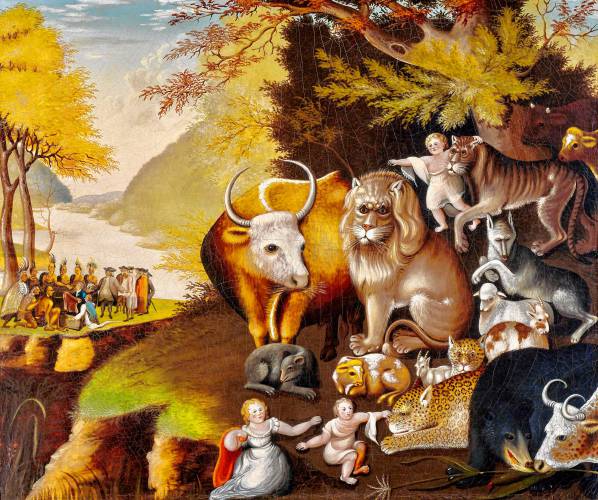Opinion: Hope & restoring community

Edward Hicks’ “The Peaceable Kingdom,” inspired by the Old Testament passage Isaiah 11:6-8. Courtesy
| Published: 07-16-2024 6:00 AM |
Scott Dickman lives in Concord.
Curiously, with all that the world of art has to offer, one of my favorite paintings is Edward Hicks’ “The Peaceable Kingdom,” an image by all accounts drawn from the Old Testament passage Isaiah 11:6-8. In this passage, an aspirational and timeless evocation of a world where conflict recedes and reconciliation prevails, it is prophesied that “the wolf will live with the lamb, the leopard will lie down with the goat, the calf and the lion and the yearling together…” It’s a universally compelling image that symbolizes replacing conflict with peace, unity and a hopeful vision for the future.
Not being religious in the traditional sense, if you were to inquire why this painting opens my heart as it does, and why at this time, I offer the following reflections.
We know all too well these are difficult and challenging times, our social fabric rife with political divisions, rancor and social discord — hence, my visceral attachment to the vision embodied by “The Peaceable Kingdom.” By extension, I’ve long been interested in conflict resolution and the forces that detract from it. Overwhelmingly, research conducted by psychologists, sociologists, and neuroscientists has confirmed that trying to change someone’s opinion is a fool’s errand.
Generally accepted explanations for our resistance to pause and re-examine opinions we fiercely adhere to include such factors as cognitive dissonance, confirmation bias, implicit bias, social identity, group belonging, emotional investment, fear of uncertainty, etc. Space constraints prevent expanding on their professional observations here, but it should come as no surprise these all too human characteristics have a profound influence on our perceptions, decisions, and behaviors, often without our conscious awareness.
So, if changing someone’s opinion has little likelihood of success, and during periods of stress a flourishing and productive society requires respectful and productive conversation for social healing to commence, I have identified at least two organizations that offer a path forward, and I have joined both. They are The Compassionate Listening Project (TCLP) and Braver Angels (BA). Allow me to explain.
My connection with TCLP is grounded in the belief that, as one of our training manuals states, (“Practicing the Art of Compassionate Listening,” by Andrea Cohen): “We believe that by opening and changing our hearts, we can contribute to changing the world – one person at a time.” Indeed. A vision and personal practice that requires engagement with and holding space for the myriad complexities of the world, all the while deepening our capacity for personal growth and cultivating meaningful connections with one another.
And, returning several days ago from the Braver Angels National Conference, my expectations were completely validated! BA’s core values align so closely with those of TCLP, that facilitators from TCLP were invited to introduce a workshop at the conference with the objective of enhancing BA’s own communication model. Referred to as “LAPP” (Listen, Acknowledge, Pivot and Perspective), LAPP guides individuals holding divergent political opinions to productively engage with one another. Complying with BA’s request, we demonstrated how LAPP might be deepened further by introducing CL techniques and, by any measure, we were successful beyond our expectations.
Article continues after...
Yesterday's Most Read Articles
There, on the Carthage College campus along the vast shores of Lake Michigan, I witnessed how some 700+ individuals from across the political spectrum eagerly broke bread together, seeking every opportunity to meet and engage in conversation while leaving “judgment” and the attendant discord aside. Overall, the experience was revelatory. Why? If previously asked whether communion among competing values and ideologies would be possible in the political realm, my response might have been “When pigs fly.” No more.
In closing, I believe now is not the time to forsake hope for the undemanding allure of cynicism. Nelson Mandela wrote, “May your choices reflect your hopes, not your fears.”







 Opinion: Trumpism in a dying democracy
Opinion: Trumpism in a dying democracy Opinion: What Coolidge’s century-old decision can teach us today
Opinion: What Coolidge’s century-old decision can teach us today Opinion: The art of diplomacy
Opinion: The art of diplomacy Opinion: After Roe: Three years of resistance, care and community
Opinion: After Roe: Three years of resistance, care and community
